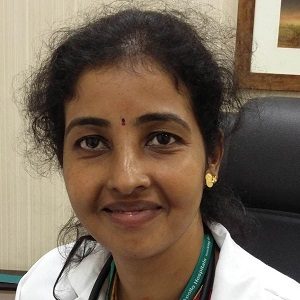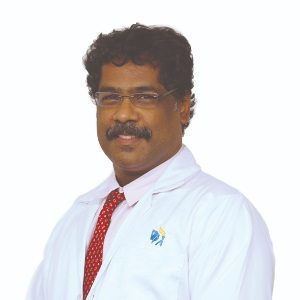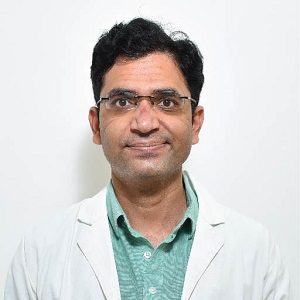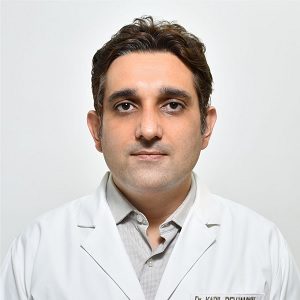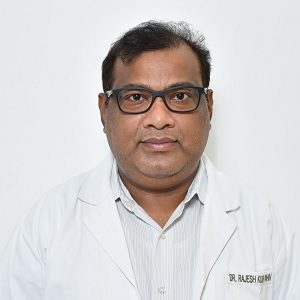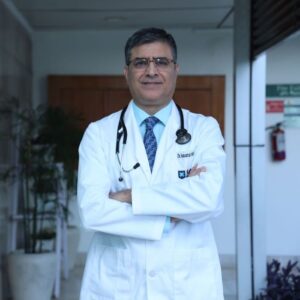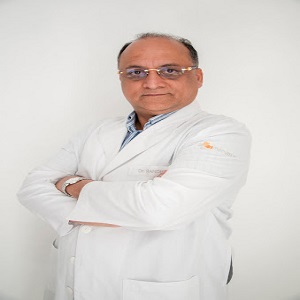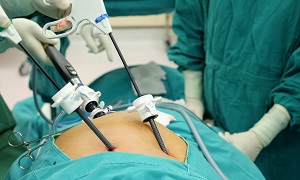Best Doctors in India for Colectomy
- Gastroenterologist and GI Medicine Specialist, Chennai, India
- Over 18 years’ experience
- Apollo Hospitals Greams Road
Profile Highlights:
- Dr. Preethi M is one of the best gastroenterologists in India, with 18 years of expertise.
- Dr. Preethi received many awards for her contribution to the field.
- She offers consultation for Irritable Bowel Syndrome (IBS), Hemorrhoids, Endoscopy, female problems, and other gastrointestinal issues.
- Gastroenterologist and GI Medicine Specialist, Chennai, India
- Over 23 years’ experience
- Apollo Hospitals Greams Road
Profile Highlights:
- Dr. Ubal Dhus is a GI specialist doctor in South India who is proficiently managing Gastroenterological disorders for the past 23 years.
- He acquired his medical degree from Madras University, Chennai, and served people with Hemorrhoids Treatment, and Irritable Bowel Syndrome (IBS) Treatment.
- Gastroenterologist, Gurugram, India
- Over 7 years’ experience
- Artemis Hospital, Gurgaon
Profile Highlights:
- Dr. Abhinandan Mishra is one of the young Gastroenterology doctors in Gurugram who is particularly interested in inflammatory bowel disease treatment.
- Dr. Abhinandan Mishra offers Endoscopic Retrograde Cholangiopancreatography, Ascites tap, Endoscopy, Peroral Endoscopic Myotomy, Capsule Endoscopy, Esophageal Manometry, Magnetic Resonance Cholangiopancreatography, etc.
- Gastroenterologist, Gurugram, India
- Over 15 years’ experience
- Artemis Hospital, Gurgaon
Profile Highlights:
- Dr. Kapil Jamwal is a renowned GI practitioner in Gurugram with an extensive experience in digestive and liver disease.
- The specialist offers treatment for Hepatitis B, Jaundice, Hepatitis C, Inflammatory Bowel Syndrome, Acute Pancreatitis, Liver Diseases, and Irritable Bowel Syndrome.
- Gastroenterologist, Gurugram, India
- Over 18 years’ experience
- Artemis Hospital, Gurgaon
Profile Highlights:
- Dr. Rajesh Padhan is a renowned Gastroenterologist in Gurugram with an extensive experience of more than 18 years in the field.
- He is skilled in carrying out various endoscopy procedures such as Colonoscopy, Endoscopic retrograde cholangiopancreatography, Endoscopic ultrasound, upper GI endoscopy, etc.
- Top Gastroenterologist & Hepatologist | Max Hospital, Saket, New Delhi, India
- 28+ Years Experience
- Max Super Specialty Hospital, Saket, New Delhi
Profile Highlights:
- Dr. Kaushal Madan is a renowned Gastroenterologist and Hepatologist in India with over 28 years of experience.
- He specializes in diagnosing and treating various digestive system disorders, including liver cancer, liver cirrhosis, fatty liver, and hepatitis B and C.
- Dr. Madan provides comprehensive care to liver transplant recipients, offering both pre- and post-operative support.
- He currently serves as the Director and Head of Clinical Hepatology Department at Max Super Speciality Hospital in New Delhi.
- Gastroenterology, Medanta - The Medicity, New Delhi, India
- 40+ Years Experience
- Medanta-The Medicity, Gurgaon
Profile Highlights:
- Dr. Randhir Sud is a preeminent figure in the field of gastroenterology, renowned for his groundbreaking contributions to gastrointestinal endoscopy and therapeutic interventions.
- As the Chairman of the Gastroenterology department at Medanta in Gurugram, Dr. Sud has played a pivotal role in advancing the field of gastroenterology in India.
- Dr. Sud is credited with revolutionizing the practice of gastrointestinal endoscopy in India. He has been instrumental in establishing and integrating advanced GI endoscopic therapy into clinical practice through extensive training programs and live workshops.
Best Hospitals in India for Colectomy
Hospital Highlights:
- Apollo Hospitals is a private healthcare group in India, with its headquarters based in Chennai. Established in 1983 by Dr. Prathap C. Reddy, the group offers a wide range of medical treatments and services across various specialties.
- It is renowned for emphasizing innovation and utilizing cutting-edge medical technologies into patient treatment.
- Known as India’s first corporate hospital, Apollo Hospitals is often credited for pioneering the private healthcare revolution in the country.
- With clinics and hospitals located all throughout India, Apollo Hospitals is a nationwide healthcare organization. Its presence can also be found in foreign countries.
- Preventive health examinations, medical and surgical treatment, and diagnostic centres are just a few of the services that the Apollo group provides.
- The group has several centres of expertise, including Cardiac Sciences, Neurosciences, Orthopedics, Emergency Care, Cancer Care, and Organ Transplantation.
- City: Chennai, India
Hospital Highlights:
- RIMC is a multi-specialty hospital in a sprawling area of 36 acres located in Chromepet, Chennai, Tamil Nadu, India.
- The facility has 450 beds including 130 critical care beds, 9 operating rooms, modern reference laboratories and radiology services, and is conveniently located near road, rail and air transportation.
- RIMC is led and managed by world-renowned physicians committed to healthcare.
- RIMC offers the broadest range of clinical care, education, and research. The hospital offers state-of-the-art technology and modern treatment facilities designed to provide health care at an affordable cost.
- Rela Institute is driven by patient needs, comfort and confidence.
- City: New Delhi, India
Hospital Highlights:
- Fortis Hospital in Shalimar Bagh is a multi-super specialty hospital that strives to provide world-class patient care by leaving no stone unturned.
- Fortis, Shalimar Bagh, with 262 beds and a 7.34-acre footprint, provides the best level of medical care through its team of doctors, nurses, technicians, and management professionals.
- City: Bengaluru, India
Hospital Highlights:
- Established in 2007, the Apollo Hospitals Bangalore is a 300-bed multispecialty hospital situated in Bannerghatta Road, Bangalore.
- Equipped with the state-of-the-art technology, it is a leading hospital dedicated to providing healthcare needs to patients with compassion and expertise.
- It is the first hospital to have completed the highest number of Robot Assisted Heart Surgeries in India.
- Over the years, it has successfully conducted some of the rarest medical procedures such as spinal angiolipoma excision, autologous chondrocyte implantations, and tibial tuberosity shift with MPSL reconstruction.
- The Apollo Hospitals Bangalore has the reputation of performing the greatest series of airway stents in the country.
- Additionally, the hospital is known for providing comprehensive treatment in specialties such as gastroenterology, urology, gynecology, oncology, colorectal surgery, etc.
- The “The Minimal Access Surgery Centre” (MASC), one of Apollo Hospitals, Bangalore’s premier Centres of Excellence, is devoted to the use of minimally invasive surgical procedures.
- In 2013, THE WEEK-A C Nielsen, Best Hospital Survey ranked Apollo Hospitals Bangalore as the 2nd best multi-speciality hospital in Bangalore.
- City: Mumbai, India
Hospital Highlights:
- Gleneagles Global Hospital The 450-bed facility comprises of 17-stories, housing state-of-the-art infrastructure, and advanced medical care facilities.
- The hospital offers end-to-end clinical, surgical, and diagnostic services. It is equipped with a team of eminent medical professionals aided by qualified nurses and medical staff
- The Hospital offers advanced Endoscopic procedures, Hepatobiliary and Liver Surgeries, Surgical and Medical Gastroenterology, Bariatric Surgery, and Robotic surgery.
- The hospital is a center of excellence for Orthopedics, Joint Replacement, Knee Replacement, and Hip Replacement surgery.
- City: Hyderabad, India
Hospital Highlights:
- CARE Hospitals were established in the year 2000, by CARE Group.
- The multispecialty hospital has 435 beds, including 120 critical care beds, with an annual inflow of 180000 outpatients and 16,000 in-patients.
- The hospital provides specialty medical services in Cardiology, Cardiothoracic Surgery, Pediatric Cardiology, Pediatric Cardiothoracic Surgery, Neurology, Neurosurgery, Nephrology, and Urology.
- The hospital has the first dual source, 128 slice CT scanner (for high precision cardiac imaging) – the first of its kind in south India.
- The hospital offers a wide range of accommodation facilities for the convenience of its varied patient base, ranging from general wards to super deluxe rooms.
- City: Mumbai, India
Hospital Highlights:
- Fortis Hospital in Mulund is a 315-bed multi-speciality tertiary care hospital with five JCI accreditations that offers a wide variety of diagnostic and treatment services. The Fortis Hospital in Mulund delivers patient-centred treatment with cutting-edge technology, highly skilled and experienced surgeons, and paramedical staff.
- This institution houses Maharashtra’s largest multi-organ transplant centre. It is also the first heart transplant centre in western India to conduct 100 or more consecutive heart transplants in under four years. It is the only hospital in the city to have multi-organ transplants and has handled the youngest patient for angioplasty. Fortis Hospital Mulund now boasts the first advanced surgical robot in central Mumbai.
- Cardiology and heart surgery, urology, nephrology, neurosciences, orthopaedics, digestive care, emergency and critical care, and maternity care are among the services provided by the hospital.
- City: New Delhi, India
Hospital Highlights:
- Manipal Hospitals, Dwarka, is a super-specialty hospital in Dwarka, New Delhi, which is a part of Manipal Hospitals Group.
- The hospital aims to provide the best treatment on par with international standards at a fraction of the cost.
- Equipped with 380 beds, the hospital is also one of the new age hospitals which are equipped fully with state-of-the-art infrastructure, cutting-edge technology as well as the latest and advanced clinical practices. The hospital also has 13 modular Operation theatres with 118 beds which are solely meant for critical care.
- The hospital comprises internationally acclaimed doctors and highly professional and experienced hospital and medical staff who are able to provide preventive, therapeutic, and diagnostic services all under one roof.
- City: Chennai, India
Hospital Highlights:
- Located in Chennai, India, MGM Healthcare is a top multispecialty hospital that provides all medical services under one roof.
- Since its founding in 2019, MGM Healthcare has quickly become a leading national referral centre, creating several innovative flagship initiatives.
- MGM Healthcare combines next-generation medical and digital technologies to provide better patient results.
- With 12 centres of excellence, more than 400 inpatient beds, 100 intensive care unit beds, and 24/7 emergency care, MGM Healthcare leaves no chance in redefining the patient experience in Chennai.
- MGM Healthcare boasts 250+ expert doctors across 30+ departments, including Cardiology, Pulmonology, Neurology, Obstetrics & Gynaecology, and more.
- They house 12 specialized Centres of Excellence, including Neurosciences, Orthopaedics, and Multi-Organ Transplantation.
- Their team of doctors, nurses, and paramedics works together to give every patient individualized treatment.
Hospital Highlights:
- Lilavati Hospital & Research Centre is India’s premier multi-speciality tertiary care hospital and has been recognised as a global medical excellence centre.
- Lilavati Hospital & Research Centre has built an unrivalled level of trust with its patients over the years, thanks to a solid foundation that comprises cutting-edge facilities, the best medical competence, research, education, and charity endeavours.
- The hospital is quite proud of the fact that it now serves patients from all kinds of backgrounds, not just from the United States but from all around the world.
- The hospital has a total of 323 beds, one of the largest Intensive Care Units (ICUs), 12 Operation Theatres with modern amenities, over 300 consultants, and almost 1,800 personnel.
COLECTOMY
Colectomy is a surgery for removing a part of the colon or all of it. It is also known as large bowel resection. Colon also known as large intestine, is a long tube-like organ which lies at the end of the digestive tract. Colectomy can be required to treat or prevent any diseases or conditions which can affect the colon.
Types
There are different types of Colectomy operations which include:
- Total Colectomy, which removes the entire colon.
- Partial Colectomy, which involves removing a part of the colon. It is also termed as a subtotal colectomy.
- Hemicolectomy, which removes the right or left portion of the colon.
- Proctocolectomy, which removes removing both the colon and rectum.
Colectomy surgery can sometimes require few other procedures for reattaching the remaining portions of your digestive system so that waste can easily leave the body.
Purpose
Colectomy is done for treating as well as preventing several diseases and conditions that can affect the colon, such as:
Unstoppable bleeding- Severe bleeding from the colon might require surgery in order to remove the affected portion.
Bowel obstruction– A blocked colon is an emergency, which may require partial or even total colectomy depending on the condition.
Colon cancer– Early-stage cancers might require removal of only a small section of the colon. However, at a later stage, it can require more of the colon to be removed.
Crohn’s disease- If medications for crohn’s disease are not being effective, you will find temporary relief from symptoms after the affected part of the colon. Colectomy is also considered as an option if precancerous changes are found during a test.
Ulcerative colitis- Your doctor might be recommending total colectomy if medications are not helping you control your symptoms. If precancerous changes are found during a colonoscopy, colectomy might also be considered an option.
Diverticulitis– Your doctor might also recommend surgery for removing the affected portion of the colon, if your diverticulitis recurs or if you are experiencing complications of diverticulitis.
Preventive surgery- If you have a high risk of colon cancer, due to the forming of precancerous colon polyps, you have the option to undergo total colectomy, as this will help you prevent cancer in the future. Colectomy can also be an option for people who are having inherited genetic conditions that might increase the risk of colon cancer.
Preparation
During the days before your colon surgery, your doctor might ask you to:
Stop taking certain medications- Certain kinds of medication can increase the risk of complications during surgery, so it is important that before you go through the surgery, you stop taking them.
Fast before your surgery- Prior to your procedure, you might need to stop eating and drinking for several hours to a day.
Antibiotics- In a few cases, your doctor may prescribe you antibiotics to suppress the bacteria which are found naturally in your colon, as this will help prevent infection.
A solution to clear your bowels- Your doctor might prescribe a laxative solution that you need to mix with water and drink over several hours, as directed by your doctor. The solution will help you empty your colon within some time.
It is also to be noted that it isn’t always possible to prepare for colectomy, as sometimes you might need an emergency colectomy, due to bowel obstruction or bowel perforation.
You will need to spend a few days in the hospital after the procedure depending on your situation. Consider making arrangements for someone to take care of your responsibilities at home as well at work.
Think ahead and pack any objects that you might need while you are recovering at the hospital.
Procedure
When it is time for your surgery, the team will take you to your preparation room, where they will monitor your blood pressure and your breathing. You might be given an antibiotic medication through a vein in your arm.
Next, they will take you to an operating room, and position you on a table. Then you will receive a general anesthesia medication and will be put to a sleep-like state so that you will not be aware during your operation.
After this, the surgical team will be proceeding with your colectomy. Colon surgery can be performed in two ways.
Open colectomy
Laparoscopic colectomy
Also known as minimally invasive colectomy, which involves multiple small incisions in your abdomen. Your surgeon will pass a tiny video camera through one incision and special surgical tools through the other ones. The surgeon will be watching a video screen in the operating room as the tools will free your colon from the surrounding tissue. The colon will be next brought out through one small incision in the abdomen. This will be allowing your surgeon to perform the operation on your colon outside of your body.
Once the repairs are made to the colon, the surgeon will be reinserting the colon through the incision.
Depending on your condition and the expertise of your surgeon, it will be decided which type of operation you will be undergoing.
Laparoscopic colectomy reduces the pain and recovery time after surgery. However, everyone cannot be considered a candidate for this kind of procedure. In some situations, the operation can begin as a laparoscopic colectomy. But circumstances can force the surgical team to convert to open colectomy.
After your colon has been repaired or removed, the surgeon will be reconnecting your digestive system so that your body can expel waste.
There are multiple options which include:
- Rejoining the remaining portions of your colon- The surgeon can stitch your colon’s remaining portions together to create what is called an anastomosis. This will allow the stool to leave the body as before.
- Connecting your intestine to an opening created in your abdomen- Your surgeon can attach your colon or small intestine to an opening created in your abdomen. This will allow the waste to leave the body through the opening called the stoma. You might need to wear a bag on the outside of the stoma to let the stool pass out properly. This may be temporary or permanent.
- Connecting your small intestine to your anus- After both the colon and the rectum is removed, the surgeon can use a portion of your small intestine for creating a pouch which is attached to your anus, to allow you to expel waste normally. However, you might experience several watery bowel movements each day.
Before you go through the operation, you will need to discuss your options with your surgeon.
After your colectomy
After surgery, the team will take you to a recovery room so that they can monitor you as the anesthesia wears off. Then your health care team will be taking you to the hospital room to continue the recovery.
You will need to stay in the hospital until you are able to regain your bowel function. You may need a couple of days to a week for this.
Since you might not be able to eat solid foods at first, they might give you liquid nutrition through a vein. Soon, you can transition to drinking clear liquids. Soon, as your intestines recover, you can eventually add solid foods.
If your surgery involved a colostomy or ileostomy for attaching your intestine to the outside part of your abdomen, you will need to meet an ostomy nurse who can guide you in how to care for the stoma. He/she will explain how to change the ostomy bag for collecting waste.
Recovery
Once you leave the hospital, you need to rest at home for a couple of weeks. Even though you may feel weak at first, you will regain your strength over time eventually.
It is best if you call a family member or a friend to help you with your daily activities until you have recovered fully. It might take some time before your healthcare team tells you that you are recovered enough to get back to your normal activities.
It is important that you take your prescribed medication as directed to prevent pain, infection and/or constipation. Consider changing your diet and drinking more fluids as well as over-the-counter medications.
Try to do deep breathing and relaxation exercises for some time during the day, especially when you find yourself extra tense.

